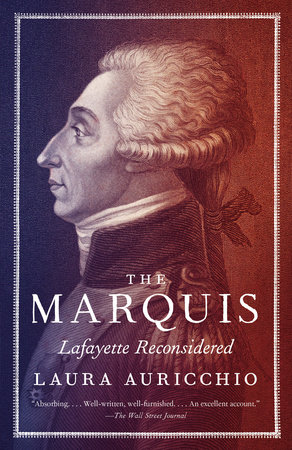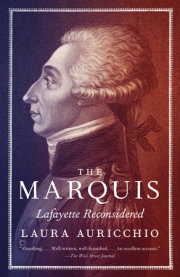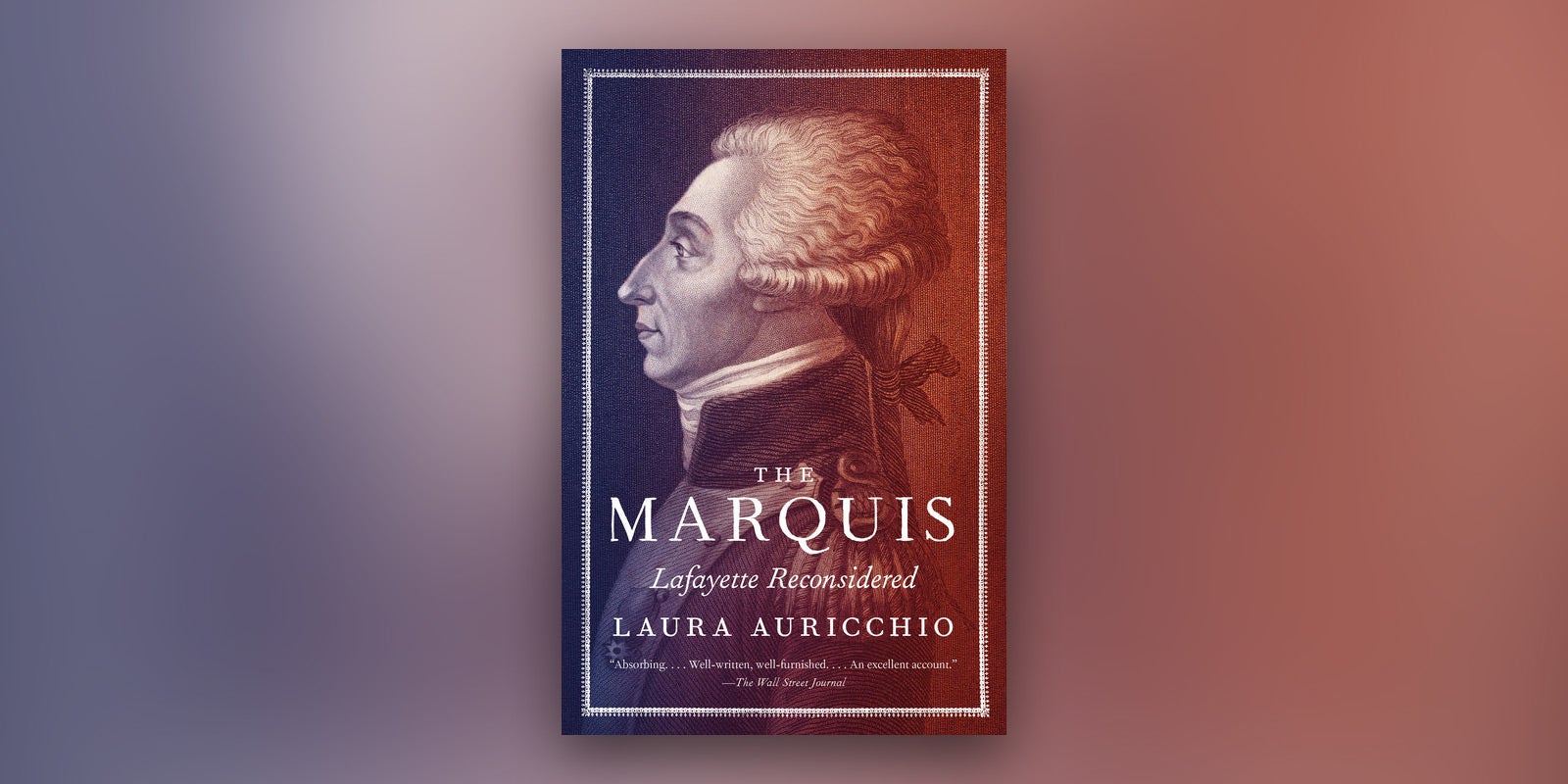INTRODUCTION
On a rainy April afternoon in 2009, I found myself scrambling to keep up with a French curator who was striding purposefully across a cobblestoned courtyard at the Château de Versailles. Coming to a sudden stop at an unmarked door, he rifled through a ring of oversized keys, turned the latch, and switched on a light to reveal a small, sparsely furnished room coated with a fine film of dust. This was clearly not one of the château’s most popular locations, but it contained the treasure I had come to see: a white marble bust of Gilbert du Motier, Marquis de Lafayette (1757–1834). Carved in 1790 by the renowned sculptor Jean-Antoine Houdon, the bust portrays Lafayette as an officer and a gentleman: his uniform signals his cherished role as commander of the French National Guard, his powdered coiffure is expertly arranged, and his firm jaw and oblique gaze suggest absorption in matters of grave importance.
As I admired this noble countenance of stone, a wry smile crept across the curator’s face. Suddenly, the silence was broken. “Why,” asked the curator, “should we have a bust of Lafayette?”
The question surprised me. After all, I said, Lafayette is the French hero of the American Revolution—the Hero of Two Worlds, the Apostle of Liberty. I had learned about him in school and knew that he was worthy of admiration. Lafayette was just nineteen years old and one of the richest men in France when he relinquished the comforts of his station to serve the cause of freedom half a world away. “The Marquis,” as Americans called him, led our troops into battle, froze with them at Valley Forge, and clothed and fed them at his own expense. News of Lafayette’s daring adventures thrilled all of France, and that excitement encouraged the French king, Louis XVI—an absolute monarch—to support a revolution. Knowing that Lafayette helped us win independence, generations of Americans have expressed our nation’s gratitude by naming countless towns, counties, streets, parks, and schools in his honor. Lafayette is so esteemed in the United States that his statue stands across from the White House, in Washington, D.C.’s Lafayette Square. A bust is just one more token of well-deserved appreciation.
After listening politely, the curator shook his head and pointed to a plaque installed a few feet away. It was a memorial commemorating the deaths of thousands of French soldiers and sailors who, sent across the Atlantic by their king, had lost their lives fighting for American freedom. He repeated the question, a bit louder this time: “Why should we have a bust of Lafayette?” These men were killed in the American Revolution, he said, but they have no statues. Louis XVI bankrupted France for the cause of American liberty and received his thanks from the guillotine. Besides, it was not Lafayette but the Comte de Rochambeau who led the French forces in America. How and why did we come to revere—of all the sons of France who came to America’s aid—the Marquis de Lafayette?
I began to see his point. During the winter of 1776, Lafayette’s inter- est in the American cause was not unique. In fact, it could hardly be called unusual. The fashionable salons of Paris were abuzz that season with talk of “les insurgents,” as the envoys sent by Congress were fondly known, and a card game called “Le Boston” was sweeping through high society. The best French homes feted George Washington in absentia, and Benjamin Franklin delighted all of Paris, where he cut a conspicuous figure in a marten-fur cap—an accessory that toyed with French perceptions of rustic Americans.
If pleasure-loving Parisians enjoyed the novelty of these New World republicans, many military men saw the Americans’ cause as an opportunity for revenge. The army had been nursing its wounds since 1763, when the French and Indian War (known in France as the Seven Years’ War) had ended with France ceding its Canadian colonies to Great Britain. By helping to wrest thirteen valuable colonies from British control, a humiliated French officers’ corps hoped to redeem itself. So pervasive was enthusiasm for the American fight that the economist and author André Morellet—an astute social observer who often accompanied Franklin on his rounds—quipped in 1777 that “there is more support for American independence in Paris than in the entire province of New York.”
Yet there was something uncommon about Lafayette’s commitment to America. His devotion was deeper than his countrymen’s, his drive more intense. While other Frenchmen sailed for the New World seeking riches or retribution, Lafayette sought nothing short of a new life. Earnest, enthusiastic—as optimistic as Voltaire’s naïf Candide—Lafayette was out of place in the glittering Parisian world of wit and cynicism that the urbane Franklin so effortlessly mastered.
Lafayette had married into one of the best-connected families of the French court, but he hailed from the Auvergne region of south-central France, and the uncontrived manners of that rural area marked him as a stranger in the refined circles of his in-laws. At Versailles, even Lafayette’s rugged appearance counted against him. The young marquis was large for his time: five feet, nine inches tall and endowed with a broad frame that one contemporary described as “decidedly inclined to embonpoint.” In other words, he tended to be stout. As Lafayette grew older, his bold features would be called distinguished, but as a youth he was not widely perceived as handsome. He had a long, oval face with a prominent aquiline nose, gray-blue eyes that peered out from a pale complexion, and a shock of unfashionably red hair atop a high, sloping forehead. Friends and admirers saw Lafayette’s open and frank expression as a window to his soul, but this transparent credulity placed him at a disadvantage in the dissimulating games of intrigue that passed for sociability at Versailles.
Lafayette felt more comfortable in the saddle than perched on a gilded stool, and he remained uneasy in a society that cultivated an ideal of disaffected nonchalance; feigned detachment was foreign to his character. Reared on tales of his ancestors’ military exploits, Lafayette yearned to prove himself worthy of such a legacy. Enthusiasm may have been unfashionable, but Lafayette made no attempt to hide his zeal. The “love of glory,” Lafayette recalled in his memoirs, inspired him to excel at school, where he vied for academic prizes bestowed in public ceremonies. The urge to escape “a life without glory,” he explained to his wife in 1777, compelled him to sail for America. “Glory,” he assured George Washington in 1778, was his only ambition. To be clear, the glory Lafayette sought was quite divorced from notions of splendor. In 1762, a French dictionary defined “glory” as a “reputation” garnered through “virtue, merit, great qualities, good actions and beautiful works”; synonyms included “honor, esteem, praise.” Once earned, glory was its own reward. Many men of Lafayette’s generation hoped for glory, but Lafayette was single-mindedly devoted to its pursuit.
In America, Lafayette found glory and more. Here, for the first time since leaving the Auvergne, he was surrounded by people who saw his sincerity as a virtue, not a flaw. The public welcomed him immediately— Lafayette was the only marquis in the American army, and his title all but guaranteed his renown. The same nation that rejected Old World traditions of hereditary privilege rejoiced to find a highborn nobleman on its side, as if his interest in the American cause proved its universal appeal. And if Lafayette’s rank opened doors, his personality won hearts. As news of Lafayette’s unaffected charm made its way through the colonies, even the most hardened anti-French feelings began to dis- solve. Then as now, Americans prided themselves on plain dealing, and those who met Lafayette were pleasantly surprised to discover that this exceptional Frenchman shared their sensibility.
Surely Lafayette deserves to be remembered. Why, then, had the French curator seemed perplexed by the bust?
Part of the answer is that Lafayette succeeded so completely in cultivating an American identity that, even in France, he remains a distinctly American hero. In 1781, after the British surrendered to allied forces at Yorktown, most of the French officers in America returned to France and to the pursuits they had left behind. But Lafayette, who had left his homeland as an outcast, had no career to reprise. Serving as America’s foremost French advocate became his primary occupation, and the spirit of the new nation assumed a position at the very core of his being. Lafayette, who called Washington his adoptive father, turned his Left Bank town house into a home away from home for visiting Americans. The Adamses, the Jeffersons, and the ubiquitous Franklin were frequent guests at Monday suppers, where English was the language of choice and where Lafayette’s children—including his son, named George Washington, and a daughter known as Virginie—sang songs in English. Mementos of the United States abounded: a gold- engraved copy of the Declaration of Independence hung on a wall of honor, plants from the New World decorated the terrace, and books on American history filled the shelves. For a time, a young man of Iroquois descent lived with Lafayette’s family as “a favourite Servant.” As the explorer John Ledyard wrote of Lafayette in 1787, “he has planted a tree in America, and sits under its shade at Versailles.”
But the curator may not have been objecting to Lafayette’s Americanization; more likely he was hinting at a darker chapter of Lafayette’s story. Although Lafayette was an indefatigable champion of righteous causes, he did not always meet with success. During the French Revolution, he failed spectacularly. In America, we remember his triumphs; in France, few outside of his native Auvergne see him as a hero. So little does France love Lafayette that the monumental Critical Dictionary of the French Revolution, published by a leading team of French historians in 1988, states flatly that “the man has drawn few eulogies.”
At the outset of the French Revolution, in 1789, Lafayette’s moment of glory seemed to be at hand. On July 15, the morning after the storming of the Bastille prison, popular acclaim placed Lafayette at the helm of the newly established National Guard. The following month, Lafayette became the first person to submit a proposal for a “Declaration of the Rights of Man”—a set of principles that would serve as the foundation of a new constitution—to France’s newly formed legislature. On July 14, 1790, Paris commemorated the first anniversary of the Bastille’s fall with a grand public festival featuring Lafayette as its undisputed star. Newspapers and broadsides compared Lafayette to Washington, and prints depicted him as a vanquisher of despotism, wielding a sword of justice.
Yet Lafayette’s French triumphs were troubled from the start. As commander of the National Guard, Lafayette was charged with the impossible task of keeping the peace in a city racked by violence. Time and again Lafayette looked on helplessly as brutal justice was meted out in the streets, and he grew to loathe the politicians who, in his view, incited the crowds to further their own interests. Although he had assisted at the birth of the United States, Lafayette rejected the notion that France could sustain an American-style republic. He believed that France’s monarchical traditions were too ancient and revered to be cast aside, and he deemed the French people too uneducated and uninterested, perhaps even temperamentally unsuited, to shoulder the burden of self-governance. Lafayette never embraced radical politics, and he made enemies of those who did. As he saw it, a constitutional monarchy was the only form of government that could guarantee liberty in France, and he defended this view to the end. In the revolution’s early days, many forward-thinking men and women shared the same hope. But as the nation grew increasingly polarized, most of his allies abandoned the dream, while Lafayette stood fast on a middle ground that was rapidly eroding.
Lafayette was proud to call himself a moderate in an era of extremes. Explaining his philosophy later in life, he insisted that “true moderation consists, not as many people seem to think, in always seeking the middle between any two points . . . but in trying to recognize the point of truth and holding to it.” Rarely has a man held to moderate principles with such tenacity. By 1791, partisans on both the left and the right (these political terms emerged precisely during this period) came to see him as a traitor to their respective causes. Supporters of the monarchy denounced him as a rabble-rouser. Centrist rivals falsely accused him of carrying on an affair with the despised queen Marie Antoinette— and commissioned a memorable series of pornographic pamphlets and prints to drive the point home. Republicans lambasted him for perceived attacks on freedom of the press. As circumstances grew ever more desperate, Lafayette made increasingly grievous mistakes. One by one, the crown, the people, and, finally, the army turned against him. Had he not fled the country in 1792, Lafayette would surely have been executed. Still he clung to his principles. By the end, they were very nearly all he had left.
Lafayette was only thirty-four years old when he went into exile, and although he lived to be seventy-six and remained active in French politics until his final days, he never stopped thinking, writing, and talking about the historic events of his young adulthood. Those events defined his life, and for that reason, they form the core of this book. Writing in 1815 to the author Benjamin Constant—a friend and political ally—Lafayette took a moment to reflect on a remarkable lifetime that had been filled with bold dreams, tremendous achievements, and tragic failures. “I have been reproached all my life,” he wrote, “for giving in too much to my hopeful disposition; I will respond that it is the only way to do something out of the ordinary. One would, indeed, never try anything extraordinary if one despaired of success.”
Why should we have a bust of Lafayette? Not because he was infallible or superhuman or endowed with gifts that the rest of us lack. We should have a bust of Lafayette precisely because he was all too human. He lived in treacherous times and made imperfect choices. He failed at more ventures than most of us will ever attempt and succeeded at efforts that stymied countless men, but he never abandoned the belief that he could change the world, and he never despaired of success. Of all his accomplishments, these might be the most extraordinary.
Copyright © 2014 by Laura Auricchio. All rights reserved. No part of this excerpt may be reproduced or reprinted without permission in writing from the publisher.





